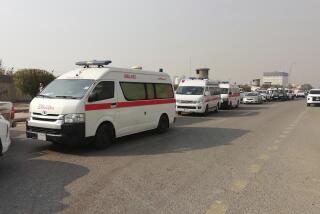Alleged mastermind of Samarra attacks slain
- Share via
BAGHDAD — U.S. and Iraqi forces announced Saturday that they had killed the mastermind of attacks on Samarra’s famed Golden Mosque, which sparked sectarian violence across the country.
Haytham Badri, who also used the last name Sabi, was killed Thursday when his car caught fire as he fled a U.S. air assault on his home, Iraqi police said. He had been hiding with a group of armed men in the Banat Hassan area of east Samarra, about 65 miles north of Baghdad.
A cousin of Badri, who spoke on condition he not be further identified, said in an interview that the dead man’s father and brother had identified the body.
Iraqi officials said Badri, field commander in Samarra for the militant group Al Qaeda in Iraq, was wanted in connection with the February 2006 bombing at the mosque that ignited sectarian violence across Iraq. He also was suspected of orchestrating the killing of Al Arabiya television correspondent Atwar Bahjat and two co-workers, who were kidnapped while covering the bombing and later shot.
“We know a lot about him. He was one of the main leaders of Al Qaeda in Iraq,” said Mowaffak Rubaie, Iraq’s national security advisor. Rubaie said Badri was “the main culprit” in the mosque bombing.
The U.S. military confirmed in a statement that Badri was killed by U.S. forces, but tied him only to a subsequent attack on the Golden Mosque on June 13, which destroyed its minarets. Fearing a repeat of the widespread bloodshed that followed the 2006 attack, officials in many parts of Iraq imposed curfews, which were credited with limiting the violence.
A dozen other insurgents were killed in the U.S.-Iraqi joint attack in Samarra, police said. Eighty-eight were arrested, including fighters from Afghanistan, Algeria, Saudi Arabia and Yemen. A man described as the militant group’s local administrative commander also was detained, police said.
National leaders Saturday were still attempting to hold together Prime Minister Nouri Maliki’s coalition government after the largest Sunni bloc in parliament, the Iraqi Accordance Front, or Tawafiq, withdrew last week. The Sunnis said their demands had not been met, including the disarming of militias, release of prisoners held without evidence and power sharing among sectarian factions on matters of national security.
At a briefing, a senior Western official called the Sunni bloc’s withdrawal a “moment of truth” for Maliki’s government.
“This is not just a tiff,” the official said. “It is a very, very serious set of disagreements that are on the table, and Maliki has to step up and start addressing them.”
The official said he was encouraged that the Sunnis had not withdrawn from parliament, which is in recess for August, and by an upcoming “leadership summit” that will address the future of legislation Washington wants passed, including laws governing oil revenue sharing and provincial elections.
The summit will include Maliki, a Shiite; President Jalal Talabani, an ethnic Kurd; Sunni Vice President Tariq Hashemi; Shiite Vice President Adel Abdul Mahdi; and possibly Massoud Barzani, president of Iraq’s semiautonomous Kurdish region.
“If this leadership summit actually does adopt this agenda and begin to address it, I could foresee the council of representatives coming back at the beginning of September and beginning to move very, very quickly on legislation because a deal would have been struck,” he said. “These next few days, the next few weeks are critical.”
Some Sunni tribal leaders allied with U.S. forces in Al Anbar province, west of Baghdad, have condemned the Sunni bloc’s withdrawal and are jockeying for the vacated government posts.
The leaders formed the Anbar Salvation Council this year to work with U.S. forces and the Iraqi government in the fight against insurgent groups. But the council split, with one faction supporting national Sunni politicians while other members sought to represent the region themselves in Baghdad.
Sheik Hameed Farhan Hays demanded that he and other members of the council be appointed to government posts.
“There is a big political vacancy and the government must resort to us to fill it,” he said.
But other council members, including Ali Hatam Salman, said they had no interest in pursuing political posts or alienating democratically elected Sunni politicians.
“All the tribes took part in the Anbar Salvation Council to get rid of Al Qaeda,” he said, but the dissenters now want to make political gains. Sunni political leaders should be chosen through elections, he said.
The U.S. military announced that a Marine was killed Thursday in Al Anbar, bringing the number of U.S. forces killed in Iraq to 3,665, according to the website icasualties.org.
U.S. forces killed four suspects Saturday in a raid on a Shiite militia group in eastern Diyala province, the military said.
In the northern city of Kirkuk, the deputy director of provincial security was killed Saturday in a drive-by shooting , police said.
In the capital, select Iraqi soccer fans gathered at the Rashid Hotel in the fortified Green Zone to cheer the national soccer team and admire the silver Asian Cup they won July 29.
Elsewhere in Baghdad, a roadside bomb targeting an Iraqi army patrol killed a civilian and injured five people. Police recovered 21 bodies Saturday.
molly.hennessy-fiske @latimes.com
--
Times staff writers Alexandra Zavis, Raheem Salman and Saif Rasheed and correspondents in Baghdad, Kirkuk, Najaf and Samarra contributed to this report.
More to Read
Sign up for Essential California
The most important California stories and recommendations in your inbox every morning.
You may occasionally receive promotional content from the Los Angeles Times.














